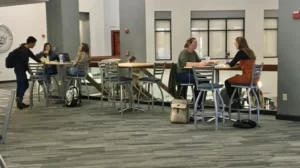
Should Students Take a Gap Year After High School? Pros & Cons
Discover the pros and cons of a gap year after high school and how to take a gap year before entering college.
A big decision is whether or not taking a gap year after high school suits you. While your peers are deciding where to apply to college, you may be wondering, “Is it a good idea to take a gap year?”
Finding your passions and life’s purpose while taking a gap year, also referred to as a bridge year, can be a great way to transition from high school to college.
Here are the pros and cons of taking a gap year after high school if you’re thinking about doing so.
Pros of Taking a Gap Year
Gap Years Help Motivate Students Who Don’t Feel Ready for College
In addition to reflecting on any college-related anxiety you may have, your gap year will allow you to gain experiences that will help you better understand the path you want to take over the next two to four years.
It will be a life-changing experience whether the gap year is spent taking additional courses abroad, working an internship, or going on new adventures.
Related: How to Apply to College After a Gap Year?
You Are More Likely to Feel Confident With Your College Major After a Gap Year
You can only truly tell if you like something after you have experienced it firsthand, including your college major. Your academic choices will be more focused and deliberate if you go into college with a sense of clarity brought on by travel.

Take a step back and consider a gap year that highlights both your academic focus and alternative options if you’re less anxious about starting at a new school and more anxious about whether you chose the right major.
Gap Years Can Make You a More Philanthropic Adult
It’s amazing how a year away can foster philanthropy and self-awareness. As you get older, you understand how crucial cultural exposure is to your development (both personally and professionally). You might also become aware of how little to nothing you actually know about those who are different from you.
For this reason, gap years are crucial; more than 90% of past participants in gap years agree that going away for a year gave them a better appreciation of and understanding of other people’s cultures and traditions.
Additionally, it fosters an understanding of the significance of human rights in students and teaches them how to communicate with people from various backgrounds.
Freshman Year Courses Can Be a Breeze After a Gap Year
You’ll likely outperform the majority of students in your grade if you use your gap year wisely. You’ll be more likely to use your experience from the outside world to complete assignments, and you’ll find it simpler to adjust to strange situations (like large classrooms without a familiar face).
You will be able to recall firsthand experiences visiting museums, historical sites, and UNESCO sites while other students are fulfilling their humanities and natural sciences requirements, such as textbook memorization. Exams go much more smoothly when you can recall course material from a memorable year spent abroad.

A Gap Year Helps Prepare You for Independence
Going to college, especially if you’re living in a dorm or apartment, maybe your first time being away from home for most high school graduates. This entails that you won’t receive home-cooked meals, laundry, forced room cleaning, daily schedule management, or financial assistance.
You’ll be traveling either independently or as part of a gap year program during your year abroad before college while developing your independence skills. This opportunity will help you not only learn more about your adulting strengths and weaknesses, but it will also provide skills that can help you quickly adjust to college life.
Global Citizenship, Entrepreneurialism, Leadership
You will gain knowledge and abilities that will help you succeed in college and after graduation. These are skills that you cannot learn at a desk, but which you will unavoidably acquire through practical experience.
In taking a gap year after high school, you might learn more about who you are than anything else. A bridge year is a year of self-discovery in which you identify your true grit and passions. When you arrive on campus, you’ll be older than your years and more motivated to succeed academically.
Cons of Taking a Gap Year
Some People May Not Understand Your Choice
In the US, gap years are becoming more and more popular, but more conventional family members or teachers might not fully understand your decision.
That’s perfectly fine, but it means that you’ll have to inform those close to you of your plans and that you might feel the need to defend them to others.

Some Programs Can Add Costs to Your Educational Path
Your overall costs will be higher if you decide to take a gap year instead of switching to a four-year program and finishing on time, even if the gap year program is organized.
A gap year, which can also include time spent working and earning money, can, however, aid you in developing better educational plans and shortening your time in college.
If You Aren’t Goal-oriented, You Can Easily Get Disorganized
A gap year might not be the best option for you if you need external deadlines to get anything done and are content to lounge around all day if someone else doesn’t make you get up.
You must be able to inspire yourself to develop, learn, seize opportunities, and get ready for what comes after in order to get the most out of your gap year. The advantages and disadvantages of taking a gap year after high school largely depend on your capacity to shape the year in accordance with your goals.
Research and Planning Take a Lot of Work
Making a plan that is right for you and your needs will help you make the most of your gap year before college. Not all of your research should be done by your parents. Select the option that will best suit you at this time. Making the most of a gap year may not be possible if you aren’t willing to put in the effort.
You Might Not Be Ready to Make the Most of the Experience Yet
The decision to take a gap year experience, such as studying a foreign language in Europe, working on a farm in Australia, teaching English in Africa, or interning in South America, depends entirely on you.

A gap year abroad may seem overwhelming if you’re overly anxious and don’t feel ready to manage your own schedule, but it should feel challenging and cause you some anxiety.
Things to Do During a Gap Year as a Teen
Do you struggle with how to fill your year off? The best activities to engage in during a gap year are listed below.
Work
Let’s face it: postsecondary education is expensive, so earning some money to pay for it is a wise choice. A year on the job also provides opportunities for more than just earning money, such as getting your first job, building a network of hiring managers, adding experience to your resume as a teen, and getting references.
Before spending a lot of money on a degree or diploma, you’ll also have the opportunity to try out a potential career path.
Travel
Travel can change you in positive ways by allowing you to experience new foods, see natural wonders, and make new friends. How many places you’ll visit? Perhaps while traveling, you’ll work and attend school.
Making financial calculations can help you limit your travel options. You might even want to think about working with a travel agent, who can assist with costs, reservations, and logistics.
Volunteer
Whatever your passion, you can probably find a way to help others locally or abroad while also giving back to the community. To get you started, here are a few reputable resources to find volunteer opportunities for young Canadians:

- Canada Service Corps (CSC): This program from the Canadian government aids young people in locating meaningful volunteer opportunities that emphasize gaining experience and important life skills. Over 100 organizations that offer CSC-funded volunteer service placements across Canada are listed in a database on the website. They work in many different fields, such as peacemaking, environmental conservation, community involvement, and more.
- CanGap: provides a database of gap year internships and volunteer opportunities in Canada and abroad.
- World University Service Canada (WUSC): This Canadian non-profit organization works to “create a better world for all young people” and offers volunteer opportunities in Canada and abroad.
Learn New Skills
Perhaps you’re motivated to learn French cooking in Paris or earn your scuba certification in Australia. You can also pick up a skill closer to home; whether it’s taking horticulture classes at the neighborhood botanical garden or registering for online coding courses, you never know when these so-called hobbies may come in handy in the future.
Plan Your Next Step in Life
It’s only normal to want a break after almost 15 years of schooling. You can research colleges, consider your career options, and plan your next steps while you’re away from the traditional learning environment.
Is Taking a Gap Year Right for You?
It can be challenging to weigh the advantages and disadvantages of taking a gap year after high school. It can be helpful to keep in mind that no two gap years are the same! It’s not necessary to travel all the way across the globe and spend the entire year in a hut without electricity (although you can if that’s your thing!).
A gap year could involve getting a job in your hometown, staying put for a year, and learning a new skill online. It might entail relocating to a different US city, interning, and living with a relative. It could also mean traveling the world with just your backpack as your only form of storage. There are numerous options!
Conclusion: Take a Gap Year After High School
Despite being widespread abroad for many years, gap years are still a recent phenomenon in the US. Start by reading about various ideas for taking a gap year after high school and look online to see what programs are offered, but make sure to read more than just one promotional page.


